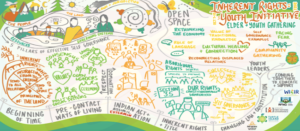Indigenous youth invited to learn about how to become inherent rights leaders

The Center for First Nations Governance is hosting five virtual storytelling sessions Sept. 15-Dec. 12. 8 and a youth and elders meeting on December 15 for Indigenous youth. – Photo attached
By Rick Garrick
OTTAWA – The Center for First Nations Governance invites Indigenous youth to learn skills needed to become inherent rights leaders and community organizers through Inherent Rights Storytelling/Youth and Elders Gathering. The initiative includes five virtual storytelling sessions taking place from September 15th to December 12th. 8, and a gathering of youth and elders scheduled for December 15.
“We asked two elders from each community to tell us stories about the five pillars of effective governance identified by the Center for First Nations Governance, which are … people; the country; systems of government; Jurisdiction and Laws; and resources,” says Amsey Maracle, coordinator of the Inherent Rights Youth Initiative (IRYI) at the Center for First Nations Governance. “We’re also going to incorporate some harvesting training, some inherent rights leadership training, where we can really delve into what these stories are teaching us, what the moral in these teachings is, and how these can be used not just to talk about our traditional Thinking about governance systems and how they can also help shape the future.”
Interested youth can register on the Center for First Nations Governance website, Maracle says, adding that they can continue to register throughout the series.
“The main part of this whole initiative is working with this IRYI core youth team and helping them become inherent rights leaders,” says Maracle.
Maracle says the September 15 visit will include stories about the human pillar in the Star Blanket Cree Nation of Saskatchewan and the October 6 visit will include stories about the land pillar in the Nishnawbe Aski Nation of northern Ontario.
“Nishnawbe Aski Nation is a partner in the project and we have two youth from their youth council who are also part of our core youth team,” says Maracle.
Lyndin Belleau, a core member of the youth team at IRYI and a Garden River citizen, says he “jumped on board” with IRYI “immediately upon learning of the inherent rights component.”
“I really wanted to use this opportunity to learn about the inherent rights of our nation and get a better understanding of what we had and what we can look forward to before contact,” says Belleau. “I only learned about court procedures and jurisdiction and what traditional governance looked like before colonial settlers from all the mediators and elders and satsan (a Wet’suwet’en hereditary chief of the frog clan and long-time spokesman for the Wet’suwet’en nation). Coming to Canada was just an eye opener.”
Belleau says he previously attended an Anishinabe course at Algoma University, where he learned more about Anishinabek’s governmental structures.
“But learn from it [IRYI] Initiative just opened my eyes so much more in terms of what we had and what’s out there and what we can look forward to as we try to go back to these traditional ways of governing,” says Belleau.
Maracle says they are looking for any elders to attend the virtual storytelling sessions at the youth and elders meetings.
“The theme for this year is to bring a new memory into the minds of our children and young people,” says Belleau. “One of Satsan’s quotes, which he always uses in his workshops, is: ‘It is time to put a new memory in the minds of our children, time to tell them a story of hope, time to tell the story of our long struggle for the right to tell self-government is over, and we won, and it’s time to put that into practice.’”